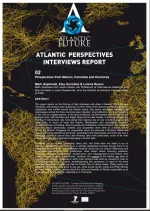Perspectives from Mexico, Colombia and Honduras

Atlantic Future Interview Report, nº. 2
This paper reports on the findings of field interviews with elites in Mexico, Colombia, and Honduras. Interviewees were questioned on their views of the relevance of issues, partners, cooperation and conflict across the Atlantic space. Key topics mentioned repeatedly by interviewees across the three countries were migration, drug trafficking, and the importance of the USA as a global partner. In the area of security, all interviewees see the USA as the principal actor, with terrorism and fragile states as the main threats. In the environment, the thinking of interviewees was more global than regional, but all saw climate change as the main issue. In terms of trade and finance, liberalization and cooperation were the predominant lines of thinking, while in people and institutions, democratization and migration were key topics. Democracy, markets, and cooperation were seen as common values across the Atlantic. Prospects for cooperation would be improved if Northern states and regions paid more attention to the South, according to the interviewees, but there was also a significant current of opinion that Latin America (and more particularly, some of its main actors, like Brazil and Colombia) is emerging in its own right.
Prospects for an Atlantic partnership seem slim, and there does not seem to be an automatic perception of the Atlantic as a relevant geopolitical concept, though there is no consensus on what is the most important obstacle. Some say it is cultural differences and government inconsistency and indifference, while others blame financing problems. Language, distance, transportation, infrastructure, poor management of aid funding, time zones, and culture were all mentioned. However, the regions of the Atlantic are seen as relevant units of study. Cooperation within Latin America was seen as valuable in order to prevent exploitation by the North. Notwithstanding this pessimism, in each of the three countries, two-thirds of elites say that an Atlantic Rim is taking shape. Public sector and academic officials are more likely to say yes, while private sector, media and NGO officials are more mixed. Likewise, opinion about the utility and benefits of Atlantic cooperation in all three states is very favorable, especially so in Honduras.